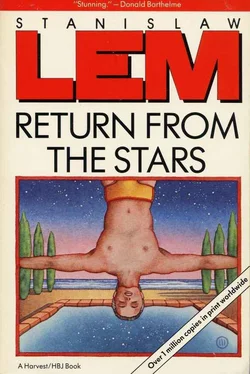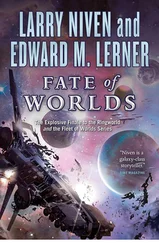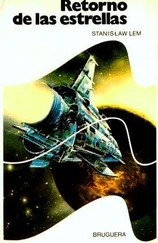“Today I have to inspect the city selex-station,” he said. “You, too, I understand, are a cyberneticist?”
“From the Stone Age,” I replied. “Excuse me… but how did you know that?”
“The travel office told me. I was naturally curious about who our neighbor would be.”
“Aha.”
We said nothing for a while; the increasing density of colored plastic outgrowths indicated our approach to the suburbs.
“If you don’t mind… I wanted to ask you if you, the crew, had any problems with your automata,” he said suddenly; it was not so much from the question itself as from his tone that I realized my answer was important to him. Was this what he was after? But what exactly did he want?
“You mean malfunctions? We had hundreds. But that was only natural; our models, in comparison with yours, were so primitive…”
“No, not malfunctions,” he hastened to reply. “Rather, performance fluctuation in such variable conditions… Today, unfortunately, we do not have the opportunity to test automata in so thorough a way.”
It boiled down to a purely technical question. He was interested merely in certain function parameters of electronic brains, how these behaved in the context of powerful magnetic fields, in nebulae, in funnels of gravitational perturbation, and he thought that this information might belong to expedition records temporarily withheld from publication. I told him what I knew, and for data more specialized I advised him to contact Thurber, who had been the assistant to the scientific director of the voyage.
“And might I give your name… ?”
“Of course.”
He thanked me warmly. I was a little disappointed. So that was all? But the conversation had established a professional bond between us, and I asked him, in turn, about his work. What was this selex-station that he had to inspect?
“Ah, nothing very interesting. A scrap dump… What I would really like to do is devote myself to theoretical work; this is in the nature of practical experience, and not terribly useful experience, at that.”
“Practical experience? Work in a scrap dump? How can that be? After all, you are a cyberneticist…”
“It is cybernetic scrap,” he explained with a wry smile. And added, somewhat contemptuously, “For we are very thrifty, you see. The idea is that nothing should go to waste. At my institute I could show you one or two interesting things, but here — well…”
He shrugged; the gleeder pulled off the main road, passed through a high metal gate, and entered the large yard of a factory; I saw rows of conveyors, gantries, something like a modernized furnace.
“Now you can have this machine,” said Marger. From an opening in the wall near which we had stopped, a robot leaned out and said something to him. Marger got out, I saw him gesticulating, then he turned to me, annoyed.
“Wonderful,” he said. “Gloor is sick. That’s my colleague — I’m not permitted to work on my own — now what am I supposed to do?”
“What is the problem?” I asked, and also got out.
“The inspection has to be carried out by two people, at least two,” he explained. Suddenly his face lit up. “Mr. Bregg! You are a cyberneticist! If only you would agree!”
“Ha,” I said, smiling, “a cyberneticist. Add: ancient. I know nothing.”
“But it’s only a formality!” he interrupted me. “I’ll take care of the technical side, of course. All we need is a signature, nothing more!”
“Really?” I said slowly. I could understand his hurry to get back to his wife, but I didn’t like pretending to be what I wasn’t; I am not cut out to be a figurehead; I told him this, though perhaps in gentler language. He raised his arms, as if to defend himself.
“Please, don’t misunderstand me! But you must be in a hurry, aren’t you? You had business in the city. In that case, I… somehow… forgive me for…”
“My business can wait,” I replied. “Go ahead, please. If I am able, I will help you.”
We went into a white building that stood to one side; Marger led me down a strangely empty corridor; several motionless robots stood in alcoves. In a small, simply furnished office he I took a sheaf of papers from a wall cabinet, spread them on the table, and began to explain the nature of his — or, rather, our — job. He was not much of a lecturer, and I soon had doubts about his chances for a scientific career: he kept assuming I had knowledge of things that were completely unknown to me. I had to interrupt him repeatedly to ask embarrassingly elementary questions, but he, understandably not wanting to offend me, received all these proofs of my ignorance as if they were virtues.
In the end I learned that for the past fifty years or so there had existed a total separation between work and life. All production was automated and took place under the supervision of robots, which were overseen by other robots; there was no longer any place in this realm for people. Society led its own life, and the robots and automata theirs; except that, to prevent unforeseen aberrations in the established order of this mechanical army of labor, periodic inspections were necessary, and they were carried out by specialists. Marger was one of these.
“There can be no doubt,” he explained, “that we will find everything normal; then we take a look at particular links in the processes, then leave our signatures, and that is all.”
“But I do not even know what is produced here.” I indicated the buildings through the window.
“Nothing whatever!” he exclaimed. “That is the whole point. Nothing. This is simply a dump for scrap, as I told you.”
I didn’t particularly care for this role unexpectedly imposed on me, but I could not keep objecting.
“All right. What exactly am I supposed to do?”
“What I do: we make a tour of the complexes…”
We left the papers in the office and went out on the inspection. First was a huge sorting plant, where automatic scoops took hold of piles of sheet metal, twisted, broken trunks, crushed them, and threw them into compactors. The blocks ejected from these traveled by belts to the main conveyor. At the entrance Marger put on a small mask with a filter and handed one to me; we could not speak to each other on account of the din. The air was filled with a rust-colored dust that burst in red clouds out of the compactors. We continued through the next hall, also filled with noise, and took a moving walkway to a floor where rows of presses consumed the scrap, which, now more finely broken down and quite featureless, was poured from hoppers. On an overhead gallery leading to a building opposite, Marger checked readings on control meters; then we went to the factory yard, where our way was blocked by a robot that said that Engineer Gloor wanted Marger on the phone.
“Excuse me, I’ll be back in a minute!” called Marger, and ran up a winding stairway to a glass annex not far away. I stood alone on the pavement, which was hot from the sun. I looked around. The buildings at the far end of the lot we had already seen; they held the compactors and presses. What with the distance and the soundproofing, not a murmur reached me from there. Off by itself, behind the annex into which Marger had vanished, was a low and unusually long building, a kind of tin barracks; I headed for it to find some shade, but the heat from the metal walls was unbearable. I was about to leave when I heard a peculiar sound coming from inside the barracks, difficult to identify, not at all like the noise of machines at work. Thirty paces farther and I reached a steel door. In front of it stood a robot. At the sight of me, the robot opened the door and stepped aside. The curious sounds became stronger. I looked inside; it was not as dark as I had thought at first. Because of the murderous heat from the sheet metal I could hardly breathe, and would have backed out immediately had it not been for the voices. For they were human voices — distorted, merging in a hoarse chorus, bluped, babbling, as though in the gloom a pile of defective telephones were talking. I took two uncertain steps, something crunched beneath my feet, and clearly, from the floor, it spoke:
Читать дальше











